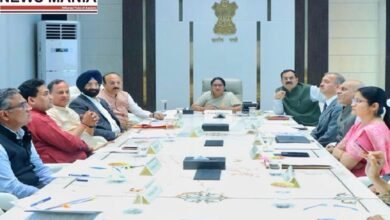NCERT Defends Revisions in School Textbooks, Rejects Saffronisation Claims

News Mania Desk/ Agnibeena Ghosh/17th June 2024
In a recent interaction with PTI editors, National Council of Educational Research and Training (NCERT) director Dinesh Prasad Saklani addressed the controversy surrounding changes in school textbooks. Responding to accusations of saffronisation, Saklani explained that the modifications, including references to the Gujarat riots and Babri Masjid demolition, were part of an annual revision aimed at creating “positive citizens” rather than “violent and depressed individuals.”
Saklani questioned the necessity of teaching young students about riots and communal violence, suggesting that such content might foster negative emotions and behaviors. “Should we teach our students in a manner that they become offensive, create hatred in society, or become victims of hatred? Is that education’s purpose?” he asked. He emphasized that children could learn about such events as they mature, but school textbooks should focus on fostering positive attitudes.
The revised Class 12 political science textbook, for example, no longer mentions the Babri Masjid by name, referring to it instead as a “three-domed structure.” The section on Ayodhya has been reduced, and the focus shifted to the Supreme Court judgment that enabled the construction of a Ram temple at the disputed site. This revision reflects the widely accepted Supreme Court verdict, and the recent consecration of the Ram idol by the Prime Minister.
Saklani defended these changes, stating that the purpose of education is to promote positivity. “We cannot have everything in them. The purpose of our education is not to create violent citizens … depressed citizens. Hatred and violence are not subjects of teaching, they should not be the focus of our textbooks,” he asserted.
He also highlighted that there has been no similar outcry over the absence of the 1984 anti-Sikh riots in textbooks, suggesting selective criticism. The recent deletions include references to BJP’s ‘rath yatra’ from Somnath to Ayodhya, the role of kar sevaks, and the communal violence following the Babri Masjid demolition.
Saklani also touched upon the inclusion of the Supreme Court verdict and other contemporary developments in the textbooks, arguing that it is essential for students to be aware of significant judicial and infrastructural developments in the country. He questioned, “If Supreme Court has given a verdict in favor of Ram temple… should it not be included in our textbooks? What is the problem in that?”
Addressing allegations of saffronisation, Saklani dismissed them as baseless. He explained that updates and changes in textbooks are based on facts and evidence, not ideological impositions. “If something has become irrelevant … it will have to be changed. Why shouldn’t it be changed? I don’t see any saffronisation here. We teach history so students know about facts, not for making it a battleground,” he stated.
Saklani, who previously headed the ancient history department at HNB Garhwal University, has faced criticism over the textbook changes, particularly those related to historical facts. He clarified that the revisions are a routine practice globally, intended to keep educational content current and relevant. The changes are decided by subject and pedagogy experts, not imposed from the top.
The NCERT’s curriculum revisions align with the National Education Policy (NEP) 2020, which aims to modernize and streamline educational content. Significant topics, including the achievements of Mughal emperors and the debate over Aryan immigration, have been either dropped or revised to reflect new information or reduce content duplication.
Saklani pointed out that some deletions were made to reduce the burden on students, especially in light of the COVID-19 pandemic. The NCERT had previously stated that content on the Ayodhya issue was updated to reflect the Supreme Court’s Constitutional bench verdict and its widespread acceptance.
In summary, Saklani defended the changes in NCERT textbooks as necessary updates rather than ideological impositions. He emphasized that the goal is to create well-informed, positive citizens and that accusations of saffronisation are unfounded. The revisions are part of a global practice of updating educational content to reflect current realities and promote a balanced, fact-based understanding of history and contemporary issues.






